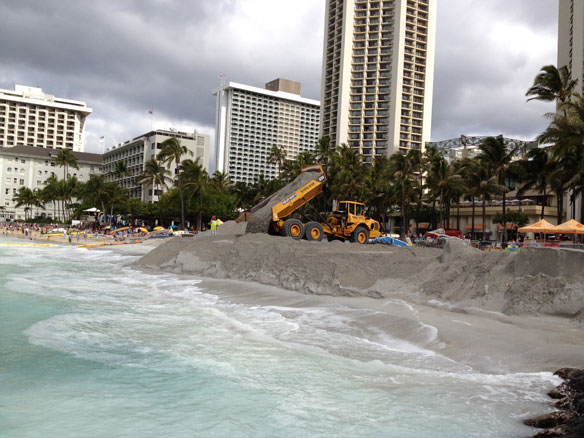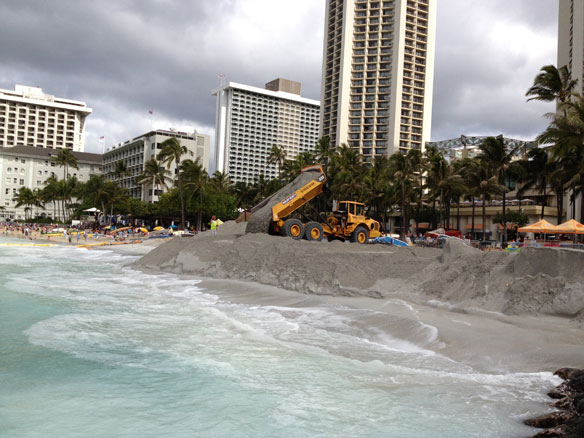
Waikiki beach-renourishement, 2012. Photograph: © SAF — Coastal Care
Excerpts;
What do you do if a beach replenishment project is not working the way it was intended? That is the question facing Sea Bright, NJ, and the U.S. Army Corps of Engineers these days.
The Army Corps has been reconstructing the beaches along the Jersey Shore that were left battered by superstorm Sandy. The beach replenishment project from Sea Bright to Monmouth Beach was completed from July to November 2013, adding 2.2 million cubic yards of sand at a cost of $25.6 million. Problem is, a section of Sea Bright’s North Beach is already eroding at an alarming rate. The erosion started two winters ago and only worsened this past winter…
Read Full Article, Asburry Park Press
Something Strange is Happening to Sea Bright’s Beach, NJ News (05-07-2015)
A section of the beach, newly widened after Hurricane Sandy, is eroding so fast that fledging dunes can’t take hold to help with storm protection.
A Beach Project Built on Sand; By Robert S. Young, PhD; New York Times (08-22-2014)
Gov. Andrew M. Cuomo announced a $207 million plan to dredge millions of tons of sand off the south shore of Long Island and spread it along the beaches and dunes. It is a colossal waste of money and another consequence of the nation’s failure to develop a coherent plan to address the risks from storms faced by states along the eastern seaboard and gulf coast…
Is Beach Renourishment Worth The Money? WWAY News (02-16-2015)
Endless Erosion Battle a Matter of Money, The St Petersburg Tribune (07-21-2014)
Waikiki Beach Eroding Less Than A Year After $2.2M Sand Restoration, Pacific Business News (01-24-2013)
A section of Hawaii’s famed Waikiki Beach is starting to erode, less than a year after the completion of a $2.2 million project to replenish the sand on about 1,730 feet of shoreline that had been suffering from chronic erosion.
Palm Beach Mid-Town Dredge Project, A Youtube Video (02-04-2015)
“Beach nourishment projects like this have become commonplace along the US East and Gulf Coasts. These projects have immediate environmental impacts through burial of nearshore habitat and increased turbidity during project placement.The cumulative environmental impacts of doing this repeatedly on the same beach while conducting projects from Maine to Texas is unknown. But, we should be concerned. ” —Robert S. Young, PhD, Director, Program for the Study of Developed Shorelines, Professor, Coastal Geology, Western Carolina University
We Need to Retreat From the Beach, An Op Ed by Orrin H. Pilkey
“”The Beaches Are Moving,” A Video featuring Orrin Pilkey, PhD
World famous coastal geologist Orrin H. Pilkey takes us to the beach and explains why erosion has become a problem…
Reuters’ Water’s Edge Report – Part I And Part II (09-19-2014)









